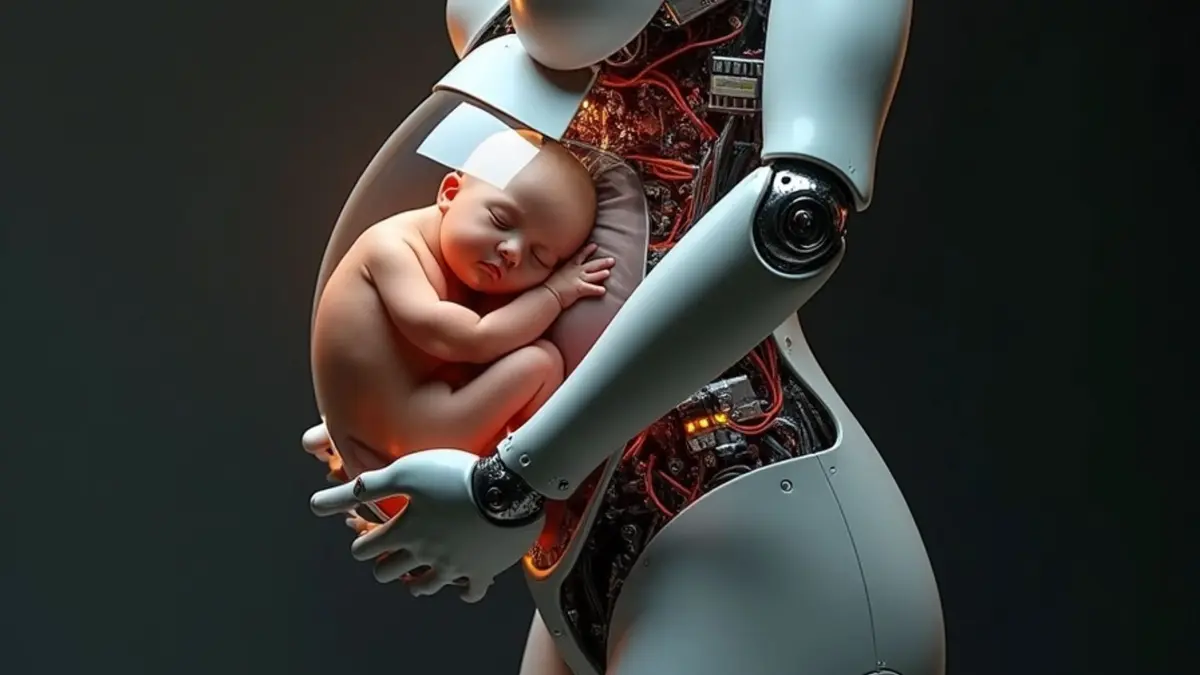In a groundbreaking announcement, Guangzhou based Kaiwa Technology revealed plans to create the world’s first pregnancy humanoid robot by 2026. Designed with an artificial womb embedded in its abdomen, this humanoid aims to carry a fetus through the entire gestation period, offering an alternative to traditional pregnancy.
Priced at under 100,000 yuan (approximately $13,900), the technology could redefine how society approaches reproduction, providing opportunities for those who wish to avoid the physical and emotional challenges of human gestation.
The core innovation of this pregnancy humanoid robot lies in its artificial womb. Unlike conventional incubators, this womb replicates natural gestation by providing nutrients and oxygen to the developing fetus in a controlled environment.
Kaiwa Technology claims the robot can simulate aspects of maternal physiology, including amniotic fluid composition, temperature regulation, and fetal monitoring systems. Dr. Zhang Qifeng, founder of Kaiwa Technology, explains that prior animal experiments laid the foundation for this innovation.
By integrating artificial womb technology into a humanoid form, the robot intends to simulate the physical and environmental conditions necessary for fetal development, potentially revolutionizing reproductive healthcare.
Artificial Womb Success in Animal Research
Artificial womb technology is not entirely new. In 2017, researchers at the Children’s Hospital of Philadelphia successfully nurtured premature lambs in a transparent biobag filled with warm, nutrient rich fluid. The lambs developed normally over four weeks, demonstrating that extrauterine gestation could sustain life outside a biological mother.
This case study provides a scientific basis for the pregnancy humanoid robot, showing that gestation outside the human body can be viable under carefully controlled conditions. While translating these results from animals to humans involves significant challenges, the success in animal studies offers a promising blueprint.
Experts are cautiously optimistic about this technology. Dr. Emily Liu, a reproductive endocrinologist, notes, The concept of a humanoid gestation system is fascinating. It could provide new options for individuals with infertility or those who cannot carry a pregnancy due to health risks.
However, she also warns, Replicating complex human processes, including hormonal signaling, immune responses, and maternal fetal interaction, in a robot is a massive challenge. The long term effects on both the child and society remain largely unknown.
Other ethicists raise questions about the societal impact of robotic pregnancy. Would children raised from artificial gestation miss the emotional and biological connection with their mother? These questions highlight the need for careful consideration alongside technological advancement.
Public Reactions
Public reactions to the news of the pregnancy humanoid robot have been mixed. Some see it as a breakthrough offering hope to those struggling with infertility or wishing to avoid pregnancy related complications.
Li Na, a young professional in Guangzhou, shared her excitement If this robot can safely carry a baby, it’s life changing. Many women want children but fear the toll pregnancy takes on the body.
Conversely, some people express unease. Concerns include the ethical implications, emotional attachment between parent and child, and potential commercialization of human reproduction. A social media user commented, This may be a technological marvel, but we must ask whether a baby born in a machine experiences the same warmth and connection as one in a human womb.
Ethical, Social, and Medical Implications
The development of the pregnancy humanoid robot raises deep ethical questions. While it could reduce risks associated with human gestation, it challenges fundamental notions of motherhood and family. Philosophers and bioethicists argue that the technology may disrupt traditional family structures and societal expectations regarding childbirth.
From a medical standpoint, the artificial womb must mimic complex maternal functions, including hormonal fluctuations, nutrient delivery, and immune protection. Any failure could impact the baby’s health, making safety protocols and long term monitoring essential.
Societal implications are also significant. If widely adopted, humanoid gestation could normalize robotic reproduction, potentially reducing human pregnancies. Policymakers and ethicists must create regulatory frameworks to prevent misuse and ensure that such advancements prioritize human well being.
Innovation Meets Responsibility
Kaiwa Technology’s pregnancy humanoid robot represents a milestone in reproductive science. Its potential benefits are undeniable reducing the physical and emotional burden of pregnancy, offering solutions for infertility, and providing new reproductive options for individuals facing health risks.
Yet, with innovation comes responsibility. Experts stress the importance of balancing technological progress with ethical consideration. Ongoing dialogue among scientists, ethicists, and the public will be crucial to ensure that this technology enhances human life without compromising moral and social values.
The arrival of a pregnancy humanoid robot could mark the beginning of a new era in reproduction. While it holds tremendous promise, society must approach it thoughtfully, addressing medical, ethical, and emotional dimensions to safeguard both children and humanity as a whole.

Interesting read! Seeing platforms like jiliaaa app casino really push for data-driven insights is a game changer. Transparency & fair play are key – RNG & analytics build trust, don’t you think? It’s cool to see innovation in the Philippines!